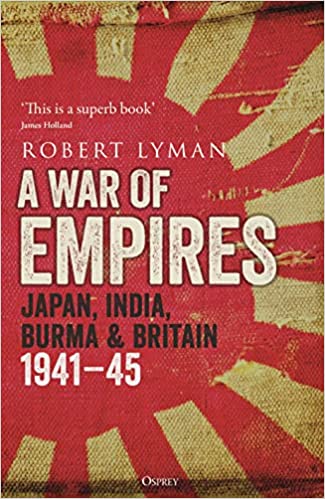Lyman, Robert. A War of Empires: Japan, India, Burma & Britain, 1941-1945. Oxford: Osprey, 2021.
My studies of the British Empire are usually front-loaded; while I’ve read broadly across all its eras, I’ve generally focused more on the 18th and 19th centuries, culminating in the Great War. I couldn’t resist the prospect of Robert Lyman’s campaign history in the Far East, however; I’d been meaning to read up on the experience of India and Britain more generally in the Pacific every since visiting the National World War II Museum in New Orleans and reading Daniel Immerwahr’s fantastic How to Hide an Empire. Little did I know just how fascinating a work I was about to read.
Lyman takes as his subject the campaigns waged primarily between 1942 and 1945 between Great Britain and Japan for control of Burma (modern Myanmar) during the Second World War. Often considered a forgotten war, at least by the forces of the Allies, these actions were simultaneously smaller in scale than most other campaigns of the war yet potentially massive in implication for the fates of the global institution known as the British Empire. In classic British Imperial fashion, the strategic and economic imperatives of defending the largest empire the world has ever known, coupled with the acute danger of a Europe collapsing before the onslaught of the Third Reich, left Burma in 1941 almost laughably underdefended; due to recent efforts to expand the Indian Army, its troop formations were both below strength and painfully green, while leadership at senior levels was both stuck in the thinking of the First World War and pathologically determined to underestimate their opponents at every turn. The Japanese, meanwhile, would prove themselves the masters of a modern jungle offensive and consummate soldiers as they steamrolled outmatched British forces into the longest retreat in British military history. Yet over the course of the next three years, the British and Indian forces would ultimately prove astonishingly open to learning from the mistakes, planning how to fix them, and executing that plan, while their opponents would steadily lose any grasp of grand strategy they ever possessed and assume they fought the same enemy with the same weaknesses as the beginning of the war. As told by Lyman, the campaigns in Burma become a masterclass in adapting to one’s situations and how to turn failure into victory.
A War of Empires, ironically, very nearly turns its victories into failures in its closing pages. As any good historian does, Lyman attempts to speak to the greater significance of his subject in his final chapter, yet in the fashion of a young student overreaching their scope, Lyman packs a near-fantastical amount of assertions into this conclusion, many of which were never previously examined in any real way. His assertions that the Indian Army played a greater role in the development of Indian nationalism and independence than previously recognized, for example, is an intriguing one, yet requires an entirely different kind of history fueled by entirely different primary sources (quoted at length) to be anything more than an idle question. Lyman also clings to the convenient myth that the British were uninterested in keeping their empire by the end of the Second World War, a fiction conclusively dispelled a decade ago in John Darwin’s The Empire Project, and even goes so far as to blame the Bengal Famine of 1943 wholly on the Japanese for provoking the war, assigning no blame to the British administrators who deprioritized the welfare of their own subjects.
If you can skip or look past its problematic final chapter, however, I cannot recommend A War of Empires highly enough as a detailed, readable, compelling military history with general lessons for how one conducts themselves in learning from failure. The events it covers certainly deserve to be discussed more in the context of the Allies’ ultimate victory in the Second World War, and while I can’t give him credit as an imperial historian, I will certainly keep my eye out for more of Lyman’s works as a talented military historian.
